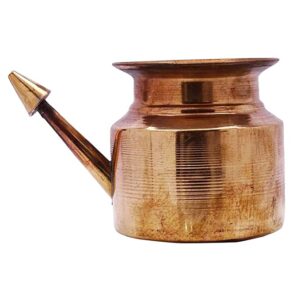Neti or nasal irrigation is an ancient ayurvedic and yogic practice of cleaning the nose with water. This is an important part of the Ayurvedic healthy lifestyle routine.
What is Neti?
Neti is a nasal cleansing technique. This is performed to clear the nasal passages. There are two types of neti, Jala neti/water neti and Sutra neti/thread neti. A neti pot is used to perform water neti. Thread neti is performed using a soft rubber catheter or a rolled cotton string that’s been dipped in melted beeswax.

What is a neti pot?
Neti pot is a medium to perform nasal irrigations or jala neti. It can be made from plastic, ceramic, stainless steel or copper. It looks like a teapot but has a longer spout.
As an Ayurvedic practitioner, I love to use copper neti pots. This has been used for thousands of years in Ayurvedic medicine. Copper is an antimicrobial metal and people used to store water in copper vessels overnight in ancient days to enhance their well being. This is known as ‘Tamara jal’ in Ayurvedic medicine. This is also the reason why copper water bottles and jugs are getting popular these days. However, other materials pots are also widely available these days.

Copper neti pots are available at AyuNature Wellness at a very affordable price. Contact the clinic if you are interested to purchase one.
Why to do neti?
Nasal rinse or jala neti is an effective method to help with a variety of symptoms such as nasal congestion, post nasal drip, runny nose or facial pain/pressure. This has been a practice since thousands of years. More recently, the clinical benefits of doing saline rinses/neti have been recognized. Studies conducted on nasal rinses such as Saline nasal irrigation for upper respiratory conditions and A review on the therapeutic effects of Neti have found Neti an effective adjunctive care for upper respiratory tract concerns.
When we breathe, we take in allergens, pollution or many forms of irritants. This can lead to increased mucus production leading to nasal or sinus congestion and/or infections. By performing nasal rinses, one can
- prevent this accumulation
- flush out mucus and other particles which helps to thin out mucus
- open up nasal passages
- reducing inflammation of the nasal mucus membranes
- maintain healthy nasal and sinus lining
- helps in the prevention of nasal dryness
- support a healthy upper respiratory system
Important Tips for Neti
- Always wash your hands and neti pot thoroughly before using.
- After use ensure to completely dry your neti pot.
- You can use non-iodised salt to help with stinging if it occurs.
- Make sure the salt is completely dissolved in water.
- If you are new to it, limit your time to 2-3 minutes a day on each nostril.
- Visit your doctor if you are having discoloured mucus or any associated concerns.
Dr Aseem Gautam
AyuNature Wellness
